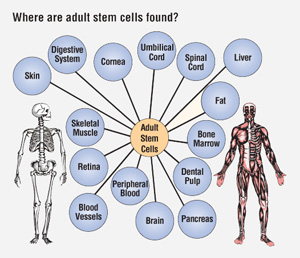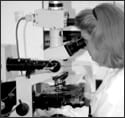Return to Human Cloning and Stem Cell Research
Cloned Human Embryonic Stem Cells
Cloned human embryonic stem cells are derived from a cloned human embryo created by asexual reproduction. Somatic cell nuclear transfer (SCNT) is the scientific term for one of the asexual processes by which a human being or animal is cloned. SCNT involves a donor egg from which the nucleus has been removed. The enucleated egg is then fused with the nucleus from a cell of the person to be cloned, yielding a cloned human embryo that begins to divide and grow in the same fashion as an embryo created by traditional reproduction. This process of human somatic cell nuclear transfer is the identical method by which animals have been successfully cloned and birthed (e.g., Dolly the Sheep, CC the cat, cattle, etc.).
How are cloned embryonic stem cells obtained?
When the cloned human embryos reach 5 to 7 days, stem cells are extracted from the inner mass of the cloned embryos. Such dismemberment kills the cloned human embryo.
What diseases are being treated with cloned embryonic stem cells?
No health benefits or cures have been realized in animal trials using cloned human embryonic stem cells. This lack of clinical evidence, coupled with the appearance of dangerous side effects in animals (the formation of tumors), has discouraged the use of cloned embryonic stem cells in human clinical trials.
What are the challenges of using cloned embryonic stem cells?
Cloned human embryos are difficult to create. Only one laboratory in South Korea has created cloned human embryos and grown them to the point where stem cell extraction is possible. Hundreds of eggs were needed to create just one cloned embryo. In addition, animals injected with cloned embryonic stem cells have developed cancer and tumors due to the unpredictable and immature nature of the genetically altered and cloned embryonic stem cells.
What ethical concerns are linked to the use of cloned embryonic stem cells?
The use of cloned embryonic stem cells requires the creation of a human life solely for the purpose of lethal scientific experimentation, and therefore, carries serious ethical implications. Furthermore, regulations ensuring that these cloned human embryos will not be implanted in the womb to birth a human clone would be impossible to enforce.
How will a human cloning ban affect the use of cloned embryonic stem cells?
Cloned human embryonic stem cell research is the only type of stem cell research prohibited by a human cloning ban.
Embryonic Stem Cells
Embryonic stem cells are derived from the human embryos created for infertile couples at in vitro fertilization (IVF) clinics. In the laboratory, IVF clinics unite sperm from the father and an egg from the mother to create a child to implant in the mother’s womb. Some parents decide not to implant and birth all their embryonic children; these “left-over embryos” may be placed for adoption, disposed of, or donated to research. In order to be used by scientists for research, parents must explicitly donate their embryonic children with informed consent, including clear acknowledgement that scientific experimentation will result in the death of their embryonic child.
How are embryonic stem cells obtained?
Embryonic stem cells are typically extracted after the frozen embryo is thawed and allowed to develop to four or five days old. Because the cells are taken from the inner cell mass of the embryo, the embryo dies during the extraction process. Embryonic stem cells extracted from donated embryos are used to start stem cell lines.
What diseases are currently treated with embryonic stem cells?
No illnesses or diseases have been treated using embryonic stem cells. In fact, embryonic stem cells have created tumors when tested in animals because of their immature and unpredictable nature. Furthermore, these cells are often rejected due to the DNA mismatch with the patient.
What are the challenges of using embryonic stem cells?
Embryonic stem cells are not used in human clinical trials because there have been no successes in animal trials. The development of tumors and terratomas (masses of flesh with eyes, hair, and teeth) has discouraged FDA approval of the use of embryonic stem cell transplants in humans. Embryonic stem cells are difficult to use because scientists have been unable to:
Establish and maintain stable cell lines of embryonic stem cells
- Obtain pure cultures in the laboratory (Embryonic stem cells are often insulated with feeder cells from mice, a method of preservation that leads to serious contamination)
- Coax differentiation of embryonic stem cells into various cell types
- Resolve problems of immune rejection due to a DNA mismatch
- Manage the proliferation of embryonic stem cells, resulting in tumors and other tissue damage
- Achieve genetic stability
- Adequately address the ethical concerns
What are the ethical concerns of using embryonic stem cells?
Embryos created for the purpose of in vitro fertilization are created with the intent to birth children. Extracting stem cells from embryos created for, but not used in, in vitro fertilization does result in the death of a unique human life and, consequently, encompasses serious ethical implications.
Would a comprehensive ban affect the use of embryonic stem cells?
Neither a state or federal ban on human cloning would prohibit in any way embryonic stem cell research that involves embryos created through in vitro fertilization, because IVF embryos are not created by cloning.
Fetal Stem Cells
Fetal stem cells are stem cells extracted from the tissues of aborted or miscarried unborn children in the fetal stage.
How are fetal stem cells obtained?
Fetal stem cells are extracted from a miscarried or aborted unborn child in the fetal stage through a tissue or blood sample. The tissue or blood sample is treated with growth factors in the laboratory, and then injected into the body of the diseased or injured patient.
What diseases are treated with fetal stem cells?
No medical treatment derived from fetal stem cells has successfully treated any human disease. In one of the most well-known human clinical trials using fetal stem cells, the cells were injected into the brains of Parkinson’s patients. Unfortunately, these unpredictable young cells created terratomas (masses of tissue with hair and teeth) and tumors, and patients experienced increased Parkinson’s symptoms.
What ethical concerns are linked to the use of fetal stem cells?
Although fetal stem cell research does not cause the death of the unborn child (as the child is already deceased at the time of extraction), ethical consideration must be given to research that depends on the death of an unborn child (especially if that death is unnaturally induced).
Will a human cloning ban affect fetal stem cell research?
A human cloning ban would not prohibit in any way the use of fetal stem cells.
Adult Stem Cells
Adult stem cells reside throughout the human body within tissue, blood and organs; they are plentiful and readily available. Adult stem cells do not have to come from an adult; rather, “adult” refers to the stage or maturity of the stem cell, distinguishing the cell from those stem cells extracted from pre-born humans (embryos and fetuses). Adult stem cells are also found in the tissues of the umbilical cord (after live birth), spinal cord, fat, bone marrow, dental pulp, nasal cavity, brain, peripheral blood, blood vessels, skeletal muscle, skin, cornea, digestive system, retina, liver, and pancreas.
 |
| From Cloning |
How are adult stem cells obtained?
Adult stem cells are drawn from the body of the patient in a tissue or blood sample without harm to the individual. The cells are then transferred to the laboratory where they are cultured and coaxed to multiply. A dozen extracted adult stem cells may multiply into millions of new cells that are genetically identical to the original extracted cells. After the cells multiply, the healthy cells are re-inserted into the body of the patient where the cells differentiate into the appropriate cell type. Human clinical trials show that these new cells travel to the diseased or injured body part and begin repair and tissue regeneration.
What human diseases or conditions are currently treated with adult stem cells?
While adult stem cell research is by no means a perfected process, there are dozens of human diseases and conditions that have been successfully treated with adult stem cells.
- Cancers—lymphomas, multiple myeloma, leukemias, breast cancer, neuroblastoma, renal cell carcinoma, ovarian cancer
- Autoimmune diseases – multiple sclerosis, systemic lupus, rheumatoid arthritis, scleroderma, scleromyxedema, Crohn’s disease
- Anemias – including sickle cell anemia
- Immunodeficiencies – including human gene therapy
- Bone/cartilage deformities – children with osteogenesis imperfecta
- Corneal scarring-generation of new corneas to restore sight
- Stroke – neural stem cell implants
- Repair of cardiac tissue after heart attack
- Parkinson’s – neural stem cells transplants
- Growth of new blood vessels – e.g., prevention of gangrene
- Gastrointestinal epithelia – regeneration of damaged ulcerous tissue
- Skin – grafts grown from hair follicle stem cells
- Diabetes – islet cell transplants to restore insulin production
- Paralysis – neural stem cell transplants
To what is the success of adult stem cell therapies attributed?
Adult stem cells have had proven success in laboratory culture, animal models of disease, and in human clinical treatments. Adult stem cells:
- generate virtually all adult tissue types
- multiply almost indefinitely, providing quantities sufficient for clinical treatments
- hone in on damage
- mature at a manageable pace thereby avoiding uncontrollable multiplication which can result in tumor formation
- contain the exact DNA of the patient, thereby precluding transplant rejection
- do not involve any ethical quandary
What are the challenges of adult stem cell research?
Sometimes adult stem cells are difficult to identify or distinguish from other cells due to their abundant presence throughout the body and varying appearances depending on their location.
What ethical concerns are linked to the use of adult stem cells?
Unlike other types of stem cell research, the procurement and use of adult stem cells never requires the creation or destruction of innocent human life, and therefore, no ethical challenges arise.
How will a comprehensive cloning ban affect adult stem cell research?
A human cloning ban would not prohibit in any way the use of adult stem cells.



